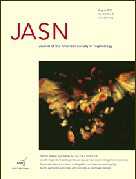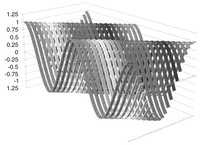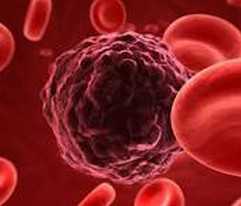JASN:血液循环因子suPAR或与引发肾衰竭原因相关联
2013-05-06 T.Shen 生物谷
2012年11月26日 讯 /生物谷BIOON/ --近日,刊登在国际杂志Journal of the American Society of Nephrology (JASN)上的一篇研究报告中,来自拉什大学医学中心的研究者表示,易患肾脏衰竭的病人,其更易于在血液循环中存在高水平的特殊因子。这项研究揭示了这种特殊因子可以用于监测病人的疾病发病进展以及病人对不同疗法的反应,其或许也是未来治疗难治性
2012年11月26日 讯 /生物谷BIOON/ --近日,刊登在国际杂志Journal of the American Society of Nephrology (JASN)上的一篇研究报告中,来自拉什大学医学中心的研究者表示,易患肾脏衰竭的病人,其更易于在血液循环中存在高水平的特殊因子。这项研究揭示了这种特殊因子可以用于监测病人的疾病发病进展以及病人对不同疗法的反应,其或许也是未来治疗难治性疾病的一个潜在的疗法靶点。
局灶性节段性肾小球硬化症(FSGS),其主要表现为肾脏结疤,是一种在儿童和成年人中高发的致死性疾病,目前许多疗法并没有效果,病人最终不得不进行肾脏移植。研究者表示,血液中高水平的可溶性尿激酶受体(suPAR)其在FSGS病人中过量产生,在该疾病的发病过程中扮演着重要角色,当suPAR处于高水平时,其会结合至肾脏足细胞上,并且破坏足细胞,引发肾脏的低效率过滤以及蛋白尿,最终引发肾脏衰竭。
本文中,研究者对北美的70名FSGS患者、欧洲的94名儿童FSGS患者以及150名没有FSGS病症的参与者进行了研究,同时研究者也分析了这些参与者在接受不同药物治疗后的suPAR的水平。
结果显示,两组人群中,分别有84%和55%的FSGS患者,其血液中存在高水平的suPAR,而对照组人群中仅有6%的人群出现了高水平的suPAR。使用吗替麦考酚酯(一种免疫抑制剂)进行治疗后,患者明显降低了其尿液中蛋白质的分泌;使用环胞素A进行治疗的患者,其并不会产生上述效应。
研究结果揭示,suPAR的血液检测或许可以用于监测病人的疾病发展以及病人对于不同疗法的反应。同时,抗suPAR疗法或许帮助降低FSGS病人的负担,肾脏移植后FSGS依然可以复发,因此suPAR的移除或许可以帮助病人进行肾脏移植后的治疗。
与肾衰竭相关的拓展阅读:

Circulating suPAR in two cohorts of primary FSGS.
Abstract
Overexpression of soluble urokinase receptor (suPAR) causes pathology in animal models similar to primary FSGS, and one recent study demonstrated elevated levels of serum suPAR in patients with the disease. Here, we analyzed circulating suPAR levels in two cohorts of children and adults with biopsy-proven primary FSGS: 70 patients from the North America-based FSGS clinical trial (CT) and 94 patients from PodoNet, the Europe-based consortium studying steroid-resistant nephrotic syndrome. Circulating suPAR levels were elevated in 84.3% and 55.3% of patients with FSGS patients in the CT and PodoNet cohorts, respectively, compared with 6% of controls (P<0.0001); inflammation did not account for this difference. Multiple regression analysis suggested that lower suPAR levels associated with higher estimated GFR, male sex, and treatment with mycophenolate mofetil. In the CT cohort, there was a positive association between the relative reduction of suPAR after 26 weeks of treatment and reduction of proteinuria, with higher odds for complete remission (P=0.04). In the PodoNet cohort, patients with an NPHS2 mutation had higher suPAR levels than those without a mutation. In conclusion, suPAR levels are elevated in geographically and ethnically diverse patients with FSGS and do not reflect a nonspecific proinflammatory milieu. The associations between a change in circulating suPAR with different therapeutic regimens and with remission support the role of suPAR in the pathogenesis of FSGS.
本网站所有内容来源注明为“梅斯医学”或“MedSci原创”的文字、图片和音视频资料,版权均属于梅斯医学所有。非经授权,任何媒体、网站或个人不得转载,授权转载时须注明来源为“梅斯医学”。其它来源的文章系转载文章,或“梅斯号”自媒体发布的文章,仅系出于传递更多信息之目的,本站仅负责审核内容合规,其内容不代表本站立场,本站不负责内容的准确性和版权。如果存在侵权、或不希望被转载的媒体或个人可与我们联系,我们将立即进行删除处理。
在此留言












#ASN#
68
#uPAR#
85
#血液循环#
103
#肾衰竭#
84